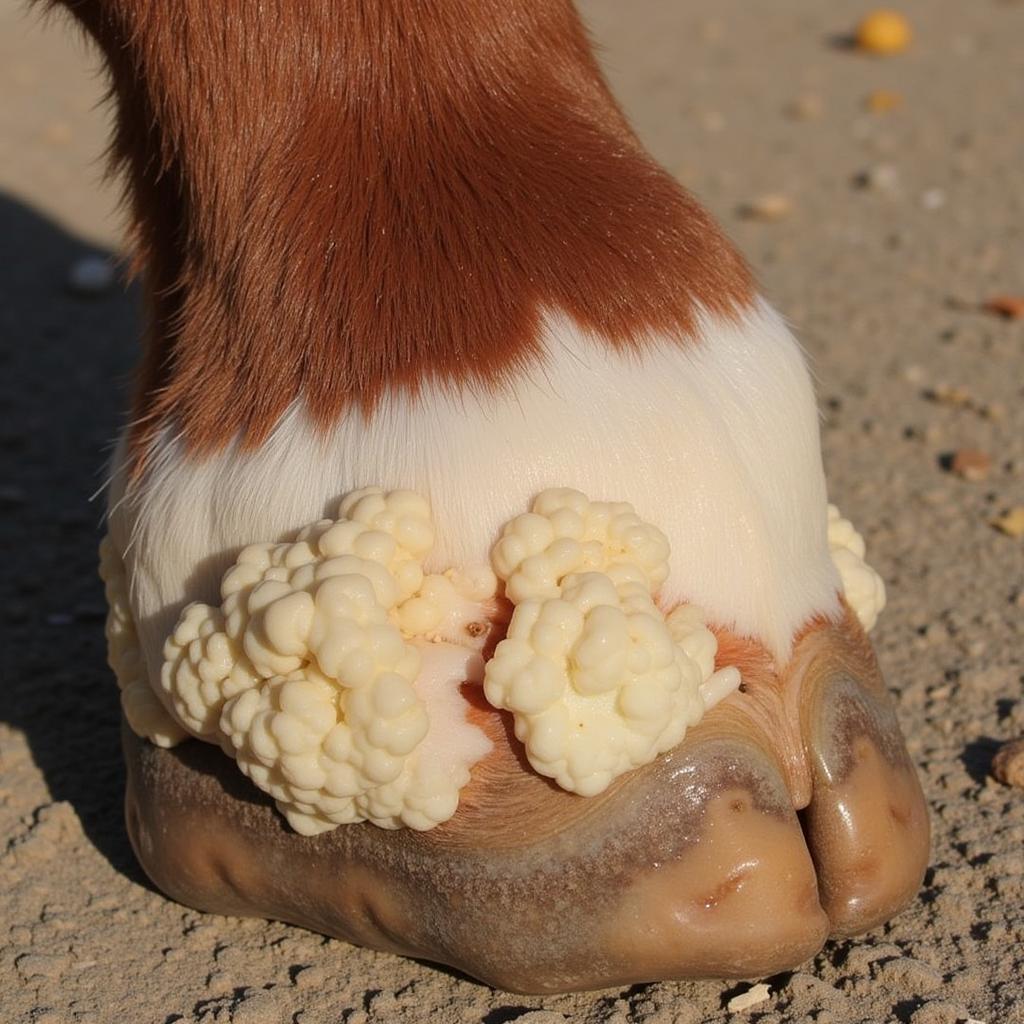Canker Treatment In Horses is a crucial aspect of equine health. This frustrating condition requires diligent care and a thorough understanding of its causes, symptoms, and treatment options. This guide will delve into the complexities of canker, providing horse owners with the knowledge they need to effectively manage and treat this debilitating disease.  Close-up of a horse hoof affected by canker
Close-up of a horse hoof affected by canker
Understanding Canker in Horses
Canker is a chronic, progressive, and debilitating disease of the equine hoof, characterized by abnormal, proliferative growth of the horn-producing tissues within the frog and sole. While the exact cause of canker remains elusive, several contributing factors are suspected, including poor hygiene, wet environments, and bacterial or fungal infections. The disease often begins in the frog, gradually extending to the sole, bars, and even the hoof wall.
Canker is most commonly seen in draft breeds, but it can affect any horse, regardless of breed or age. Early detection and treatment are critical to preventing irreversible damage to the hoof. canker horse foot is a challenging condition, but with proper management, affected horses can often return to soundness.
Identifying the Symptoms of Canker
Recognizing the symptoms of canker is vital for early intervention. The classic sign is a foul-smelling, grayish-white or pinkish discharge from the affected area. The tissue within the frog and sole will appear abnormal, often described as “cauliflower-like” or “cheesy.” Lameness, particularly in wet conditions, is another common symptom.
As the disease progresses, the horse may exhibit increased pain and sensitivity in the affected foot. If you suspect your horse has canker, it’s crucial to consult a veterinarian immediately. A prompt diagnosis is essential to implement effective canker treatment in horses. Early treatment greatly increases the chances of a successful recovery.
Canker Treatment in Horses: A Multifaceted Approach
Canker treatment typically involves a combination of surgical debridement, topical medications, and meticulous hygiene. The affected tissue must be surgically removed to expose healthy tissue. This can be a painful procedure, and sedation or anesthesia may be required.
Following debridement, topical medications are applied to control infection and promote healing. These may include antiseptics, astringents, and bandaging to protect the hoof and maintain a clean environment.
Long-Term Management of Canker in Horses
Long-term management of canker requires ongoing vigilance and strict adherence to a hygiene protocol. Keeping the affected hoof clean and dry is essential to prevent recurrence. Regular hoof trimming and shoeing, along with careful monitoring for any signs of regrowth, are crucial for successful long-term management.
Dr. Emily Carter, DVM, a renowned equine podiatrist, emphasizes the importance of diligent aftercare. “Canker treatment is not a one-time fix. Consistent hygiene and regular veterinary check-ups are key to preventing relapse and ensuring the horse’s long-term comfort.”
Preventing Canker in Horses
While there’s no guaranteed way to prevent canker, good hygiene practices can significantly reduce the risk. Keeping stalls clean and dry, regularly cleaning hooves, and avoiding prolonged exposure to wet and muddy conditions are essential preventative measures. Additionally, regular hoof inspections can help detect early signs of canker, allowing for prompt treatment and a better prognosis.
Professor John Miller, PhD, an expert in equine hoof health, advises, “Proactive hoof care is the best defense against canker. Regular cleaning and inspection can help identify and address potential problems before they escalate.” horse foot x ray can be a valuable tool for diagnosing hoof problems.
Conclusion: Effective Canker Treatment in Horses is Achievable
Canker treatment in horses can be a challenging but manageable condition. Early diagnosis, a comprehensive treatment plan, and diligent long-term care are essential for a successful outcome. By understanding the causes, symptoms, and treatment options, horse owners can play a vital role in their horse’s recovery and long-term well-being. horse chestnut for sale may not directly treat canker but it is important for horse owners to be aware of supplements for overall horse health. Don’t hesitate to seek professional veterinary advice if you suspect your horse has canker.
FAQ
- What causes canker in horses? While the exact cause is unknown, poor hygiene, wet environments, and infections are suspected contributing factors.
- What are the symptoms of canker? A foul-smelling discharge, abnormal tissue growth, and lameness are common signs.
- How is canker treated? Treatment typically involves surgical debridement, topical medications, and meticulous hygiene.
- Can canker be cured? With proper treatment and management, canker can be controlled, and affected horses can often return to soundness.
- How can I prevent canker in my horse? Good hygiene practices, regular hoof cleaning, and avoiding prolonged exposure to wet conditions can help reduce the risk.
- Is canker contagious? Canker is not considered highly contagious, but maintaining good hygiene practices is still crucial.
- What is the prognosis for a horse with canker? The prognosis depends on the severity of the case and the horse’s response to treatment. Early detection and aggressive treatment generally lead to better outcomes.
For support, contact us at Phone: 0772127271, Email: [email protected], or visit us at QGM2+WX2, Vị Trung, Vị Thuỷ, Hậu Giang, Việt Nam. We have a 24/7 customer service team.